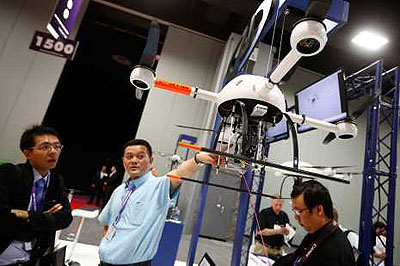In less than two years, the United States will open its commercial airspace to drones, allowing these “unmanned aerial vehicles” to zip over American cities along with planes and helicopters. Tech enthusiasts, entrepreneurs, and law enforcement agencies are intrigued by the possibilities—burrito drones! And the roughly $6-billion-a-year drone industry has launched a lobbying offensive to ensure Federal Aviation Administration regulations are as broad and permissive as possible. But lawmakers and civil liberties groups are concerned about the privacy implications and potential safety issues, and at least nine states have passed laws restricting drone use by law enforcement, private citizens, or both.
While drones were never banned in the United States, up until now their use has been strictly limited, with the FAA distributing a few hundred permits to researchers and law enforcement. But Congress has ordered the agency to open commercial airspace to a wide variety of unmanned vehicles by late 2015. And when it does, drones are bound to proliferate. The FAA anticipates there could be as many as 30,000 drones hurtling through US airspace by 2020.
Civil liberties advocates worry this trend could lead to abuses, with law enforcement agencies conducting unnecessary surveillance, especially given the lack of federal regulation governing the use of drones for law enforcement purposes. (At this point, it’s not even clear whether police need a warrant to collect data on people using drones). “It’s a core value in our society that the government doesn’t watch us and collect information about innocent people,” says Allie Bohm, an advocacy and policy strategist for the ACLU. “We need rules so that we can enjoy the benefits of this technology without becoming closer to a surveillance state.”
Politicians on both sides of the aisle share these concerns, and the FAA has promised it will take them into consideration during the rulemaking process. It plans to test privacy practices as part of its six-state pilot program, which will begin after the sites are chosen later this year. In the mean time, states are forging ahead with legislation that bars police from using drones, or at least using them without a warrant. A few states, including Texas, have also passed laws restricting private citizens from taking photos or videos with drones, while allowing law enforcement and other groups, such as licensed real estate brokers, to do so.
Our map above—which we will continue to update, with help from the National Conference of State Legislatures and the ACLU—shows which states have passed laws restricting drone use. Other states have drone legislation pending, so check with your legislature to see if a surveillance drone is coming to your hometown anytime soon.












